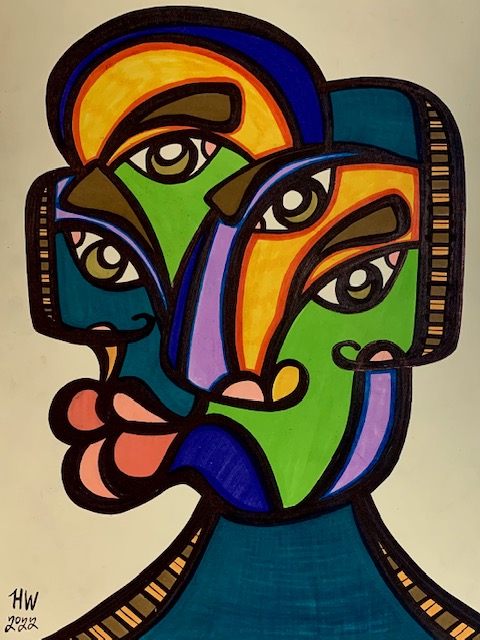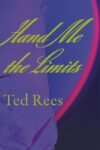This piece was originally published in the Full Stop Quarterly “Cynicism” issue (Fall 2022). Subscribe at our Patreon page to get access to this and future issues, also available for purchase here. Your support makes it possible for us to publish work like this.

One of the most memorable moments of the late ’90s MTV series Daria comes in the second season, when two characters create an art poster for a school fair. Their project depicts a gorgeous, willowy blonde girl gazing into a mirror, accompanied by a perverse little poem that undercuts the image entirely: “She knows she’s a winner/ she couldn’t be thinner/ now she goes into the bathroom and vomits up dinner.”
The author of the verse? Daria Morgendorffer, an iconoclastic adolescent whose deep intelligence was matched only by her witheringly sarcastic, no-holds-barred commentary, delivered in a flat monotone. Though ’90s sitcoms and teen dramas that unironically presented characters like the one depicted in Daria and her friend Jane’s poster, Daria sees the image as fake: It’s a moment that reveals her as a gimlet-eyed protagonist who refuses to gloss over the more unappealing side of life; instead, she looks it squarely head-on. For teens alienated by phony, relentlessly cheery dramas featuring impossibly attractive characters in unrelatable situations (think Beverly Hills 90210 or Dawson’s Creek), Daria was a lifeline, featuring a heroine who was refreshingly honest about everything from consumerism to the banality of suburban life. Airing between 1997 and 2002, the show still remains immensely popular among adult millennials, who still quote it and speculate about what became of the characters.
Daria had company, too, in Ghost World’s Enid Coleslaw and Ten Things I Hate About You’s Kat Stratford, angry and enlightened young women who looked around at the culture and called BS. But Daria had few cohorts of color—ironic, given that girls from marginalized identities have a far more clear-eyed view of the world.
So why is cynicism so seemingly tied to whiteness? After all, at Daria’s school, Lawndale High, there’s at least one other perceptive and disillusioned teen: Jodie Landon, who is Black. In one of our first introductions to Jodie, she and Daria have been asked to consider applying to Grove Hills, a school for gifted students. On the ride over, it becomes clear that while Jodie shares Daria’s low opinion of Lawndale’s football players and cheerleaders, she limits her derision to the occasional sotto voce comment (“Kevin’s great. . . at smashing beer cans with his head”). At the school orientation, Daria is wary from the get-go, but Jodie urges her to give it a chance. Yet after the girls witness the Grove Hills kids heaping scorn on another student due to his low SAT scores, Jodie calls them out as the narrow-minded, judgmental jerks that they are.
Daria tells her she should try speaking her mind more often, but Jodie confides that though she’d like to, she feels a heavy burden: “At home I’m Jodie. I can say or do whatever feels right. But at school, I’m the queen of the Negroes. The perfect African American teen. The role model for all of the other African American teens at Lawndale. Oops! Where’d they go?”
Like Daria, Jodie is academically gifted and whip-smart, though she’s also far more involved in school life—French club, student council, and the yearbook are just a few of her activities. However, Jodie’s perspective is similar to Daria’s; she’s just more guarded about her opinions.
We again see Jodie torn between her obligation to set an example and her urge to let her snarky flag fly in the episode “I Loathe a Parade.” While Daria is caught in the middle of a parade making its way through the town, Jodie and her boyfriend, Mack, stand morosely on one of the floats, having been elected as homecoming queen and king. It’s a tokenizing act that happens every year—as Mack sarcastically puts it, “It’s such an enlightened and generous gesture. It completely makes up for the town’s utter lack of diversity.”
The two are on the verge of leaving (“Why play into this stupid charade any more than we have to?” Jodie asks) when she notices a young, visibly moved Black girl in the crowd watching her closely; she straightens up and begins waving, her angsty exterior quickly swapped out for a brighter and more optimistic image. But is it a fake one? Daria would probably think so, but Jodie’s sense of protectiveness toward the young girl rings true. Still, Jodie’s frustrations are there, bubbling below the surface—she just makes the choice not to voice them.
So is cynicism less about an attitude and more about an act? If so, the freedom to express those feelings certainly seems like a marker of racial privilege. Consider the episode “Partner’s Complaint,” where Daria and Jodie pair up to do an economics project that involves applying for a small business loan. At the first bank they visit, the loan officer tells the girls that though their proposal is well put together, their age makes them high-risk applicants. Looking past self-possessed Jodie, who’s delivered the entire presentation (with Daria weighing in with a few pointed barbs), the officer notes that a loan might still be possible if Daria’s father cosigns for it. When Jodie asks about whether her father could cosign, the banker is skeptical, but upon realizing that her father is a successful and well-known entrepreneur, he suddenly takes far more interest in her.
Jodie storms out, fuming: “Listening to my business plan and all my answers to his questions, then asking if your father would cosign the loan. Why? Because you’re the right color.” But at the next bank, Jodie leads by name-dropping her father, and the girls are granted the loan right away. Later, as a much more upbeat Jodie outlines the presentation that they’ll give in class the next day, Daria is quick to comment on what she sees as Jodie’s hypocrisy—and Jodie is just as quick to call Daria out on her rigid standards: “I used the resources at my disposal to get the loan—my dad’s name. And if I happened to depart from your black-and-white world of ethics. . . and wandered into a gray area, then too bad.”
Jodie and Daria both see the world for what it is: flawed, oppressive, fake. But although Jodie is angry at the way she’s been treated, she’s willing to shift gears to get what she wants. Because her understanding of injustice is likely far firmer than Daria’s, given the countless other micro and macroaggressions she’s probably experienced, Jodie bounces back faster and adapts more readily. Her response is, in many ways, deeply cynical; she anticipates how she’s going to be viewed before she walks into that second bank, and she uses what privilege she has to nevertheless achieve her goal. But though she’s fully aware of what’s really going on, she opts not to express her true feelings.
Daria’s choice to wallow in cynicism suddenly seems like a luxury—despite snarkiness bordering on rudeness, she was still taken more seriously than Jodie at the first bank, thanks to her racial privilege. And while Daria calls out on genuine wrongs, her attitude also offers her an escape, a refuge. In many episodes, we see her ramp up the sarcasm when she’s uncomfortable—like when Daria feels left out when her best friend Jane joins the track team, or when she’s put on the spot by a well-meaning Grove Hills teacher asking her about her goals. Indeed, when Jodie tells Daria that her bleak outlook is isolating, Daria replies that it’s her coping mechanism: “I’m too smart and too sensitive to live in a world like ours at a time like this with a sister like mine. Maybe I do miss out on stuff, but this attitude is what works for me now.”
Racial privilege allows characters like Daria not simply to be cynical but to perform cynicism. Given that many characters—and people—of color are, like Jodie, often quietly negotiating the identities that they publicly present, it makes more sense that Daria may not seem to have many obvious counterparts of color. Indeed, for Black women, navigating identity is entirely different from the ways in which white women do so, as Melissa Harris-Perry, Maya Angelou Chair Professor of Politics and International Affairs at Wake Forest University, discusses in Sister Citizen: Shame, Stereotypes, and Black Women in America. In her book, Harris-Perry cites a psychological study in which people seated in chairs in rooms that were slightly askew often reported feeling as though they are perfectly straight; she compares the crooked room to the experiences of Black women, who are assailed by stereotypes such as the Mammy, the Jezebel, and the Sapphire. “When they confront race and gender stereotypes, black women are standing in a crooked room, and they have to figure out which way is up,” she writes. She notes that some “tilt and bend themselves to fit the distortion.”
But Harris-Perry also observes that others respond by overcompensating to avoid these negative stereotypes. She discusses how she convened a focus group where she asked Black women of varying ages about societal assumptions made about Black women; several of them emphasized ways in which their own behavior contrasted sharply with the stereotypical images of lazy, hypersexual, or aggressive Black women. For these women, the stereotypes are omnipresent, impossible to avoid, and making sense of one’s identity becomes a fraught act.
Like the real women Harris-Perry spoke to, Jodie is attempting to construct an identity in a world where representation of Black women and girls is as warped and twisted as a funhouse mirror. Given the tensions that Jodie navigates every day, the decision to opt out, to intentionally provoke, is one more example of privilege that Daria possesses.
But that doesn’t mean that there aren’t examples of sharp, insightful, and opinionated young women of color in pop culture, but merely that the dominant culture isn’t so eager to celebrate these characters. Think of Chantel, the protagonist of the 1992 independent film Just Another Girl on the I.R.T., an outspoken Black teen living in the projects and practiced at putting those who would judge her in their place. Or Samantha White of the film and Netflix series Dear White People, a snarky biracial student speaking truth to power over the airwaves as a radio deejay at her predominantly white college. Characters like these have an incredibly realistic and nuanced perspective on life, even if it doesn’t take the form of Daria’s hilariously dry one-liners.
And let’s not forget Jodie herself. The final episode of the series was a TV movie in which Daria and her friends made plans for college; Jodie opts for a Historically Black College, somewhere she feels she can relax and be herself. Many viewers have wondered what became of the characters, especially Jodie. With an upcoming Daria spinoff, Jodie, in the works, we may get a chance to find out—and to see an example of a smart, sensitive, and, yes, cynical Black woman carving out space for herself.
Mahnaz Dar is a book review editor based in New York. Her work has appeared in Library Journal, Screen Slate, and Fox Digital. You can reach her at @dibblyfresh.
This post may contain affiliate links.







